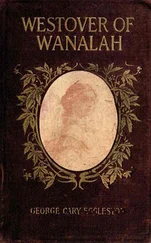Boyd told the story in minute detail, ending it by saying:
"I can make oath to all that and swear that nothing else of any kind occurred."
"No, you can't," said Jack Towns. "The court won't let you swear to any of it."
"Can I not make a statement of facts in a case that involves my liberty, my reputation, and everything else that I care for?"
"No. The law of Virginia does not permit an accused person to testify in his own behalf. That is the Common Law rule, and Virginia is under the Common Law. Don't tell me the thing is absurd, unjust, cruel, barbaric, and all that; for I know it already. It is the law, and you and I cannot change it. Let us go on with our inquiry instead. Do you know approximately at what hour you passed Le Voiser's school on your return from your visit to Milhauser?"
"I know exactly. It was precisely half-past twelve. I saw lights carried about in the school and, wondering at the fact, looked at my watch to see the hour."
"And you left Milhauser's house at what time?"
"Half-past ten."
"Why did it take you so long to get back to the hotel?"
"Milhauser's house, as you know, is away out of town—beyond Richmond College. There's a horse car which runs at irregular intervals between the college and the Broad Street end of the Fredericksburg Railroad, using the track of that railroad when no train is due. When I got to the college gate it was raining heavily and I took shelter under a sort of shed opposite the gates to wait for the car. It didn't come, and at last I decided to walk on."
"Why did you turn south and into Grace Street, instead of coming on down Broad?"
"Because it was raining and muddy, and the sidewalks are better in Grace Street. Besides, as my hotel is in Main Street I had to turn south at some point on the journey."
"Yes, of course."
After a period of silent thinking to no purpose, Jack Towns said:
"It's a queer case. All those girls swear you were in the school a little after twelve. Milhauser, if questioned, would have to swear that you left his house at half-past ten. You saw nobody else after that, who could even suggest an alibi. You got to the hotel drenched and dripping, at precisely the time you would have got there if you had been chased out of the school at the time the intruder was. You admit that you passed the school at the time of the disturbance. The case is so clearly made out against you, both by the positive testimony of eyewitnesses, and by all the circumstances, that any jury ever empanelled would have to convict you. Why, I'd feel bound to convict you myself—"
"Do you mean that you have the remotest shadow of doubt as to my innocence of this charge?" sternly demanded Westover, rising.
"Certainly not. Don't be an idiot. Sit down. But as the case stands we haven't a straw to cling to. We can't impeach the testimony of a dozen high-bred young women, every one of whom swears positively that she knows you well and that she saw you make your escape from the invaded precincts. There is no way in which we can so much as cast a doubt upon your guilt. With the case presented as it stands, any juror who should hesitate to pronounce you guilty would be a perjurer. The only hope is that we may find some way out before the case comes to trial."
"When will that be?" asked Boyd Westover, in a tone so stoically calm that Jack Towns looked at him to see what had happened to him.
"Are you ill?" he asked.
"No, not at all. It is only that I see the utter hopelessness of the case. I am a man condemned to worse than death. But I am a man and must face even such calamity without flinching. When the trial is over, I shall be a convicted felon. It will do no good to assert my innocence. Nobody will believe it—nobody can, in face of the testimony. My life is ruined, my reputation blasted, my doom sealed. But I shall neither whine nor whimper. Now tell me when the blow is to fall? When will the trial occur?"
"The court is in session now. The indictment will be found to-morrow, but I shall secure a postponement of the trial until the next term."
"Do nothing of the kind. Let the trial come on at once—the sooner the better. Delay will do no sort of good. I believe every accused person is entitled to 'a speedy trial.' Demand that for me, and secure it."
Towns argued and pleaded, but to no purpose. He could offer no suggestion of advantage in delay, except by saying:
"I have always found it worth while to trust to the unexpected. If we have time, something may happen that we don't anticipate."
"And I, in the meantime?" answered Boyd. "No. Bring the thing to a head at once. How soon can you make it?"
"Within forty-eight hours," answered the lawyer. "I advise against it, but—"
"I quite understand. The responsibility rests upon me. Go on and make an end of the horrible thing."
CHAPTER VII – IN THE VALLEY OF THE SHADOW
It was the chivalric custom of the Virginians to protect their woman-kind in all circumstances, at all costs and at all hazards, not only against wrong and danger, but equally against annoyance and especially the annoyance of publicity. Women in Virginia were proudly feminine; men intensely and bravely masculine.
Accordingly the news of Boyd Westover's case had only begun to spread abroad when all the male relatives of all the girls in Le Voiser's school set themselves to hurry their daughters, sisters and nieces into secure hiding, so that they might be spared the annoyance of appearing in court as witnesses in a criminal case.
Short as the time was, the officers sent to serve summonses upon such as were wanted found the school well nigh deserted. Some even of those on whom they succeeded in serving their subpœnas were protectingly abducted before the day of the trial by relatives who braved the penalties of contempt of court in rescue of delicately nurtured maidens dear to them.
Nevertheless there were one or two of the girls present in court when Boyd Westover was called to the bar. These had been in hiding, but their places of concealment had been discovered and the girls themselves brought by force to the court. Then too the matron was there prepared to bear unhesitating witness to Boyd's identity with the offender.
A good deal of time was consumed in securing a jury. The first man called declared:
"I would not believe this charge against Boyd Westover even if I had been present, seeing him with my own eyes." Others expressed their incredulity in different forms of words but with equal positiveness, and of course all such were rejected. It thus happened that the jury was not completed till a late hour in the day. But on the other hand it took very little time for the Commonwealth's witnesses to give their testimony, and after one or two fruitless attempts to secure from them an admission of doubt or possible mistake, Jack Towns forbore to cross examine them.
He had no witnesses to offer in his client's behalf. He had nothing to depend upon indeed except a certain persuasive eloquence which had often served him well, and this he brought to bear with all his passionate nature to stimulate it. He spoke for an hour. He argued, pleaded, persuaded. He set forth the character of his client and of the distinguished family from which he was sprung. He dwelt upon the utter improbability of the commission of such a crime by such a man. He pointed out and emphasized the fact that a girls' school was not the place that any housebreaker in his senses would think of entering in search of booty. He ended with an impassioned setting forth of the ruin and disgrace that must fall upon this high-charactered young man as the result of an adverse verdict. So eloquently and so pathetically did he present the pitiful aspect of the matter that tears ran down scores of cheeks, and the Judge himself bowed his head upon the desk in front of the bench, as if to conceal an emotion he could not control.
Читать дальше












